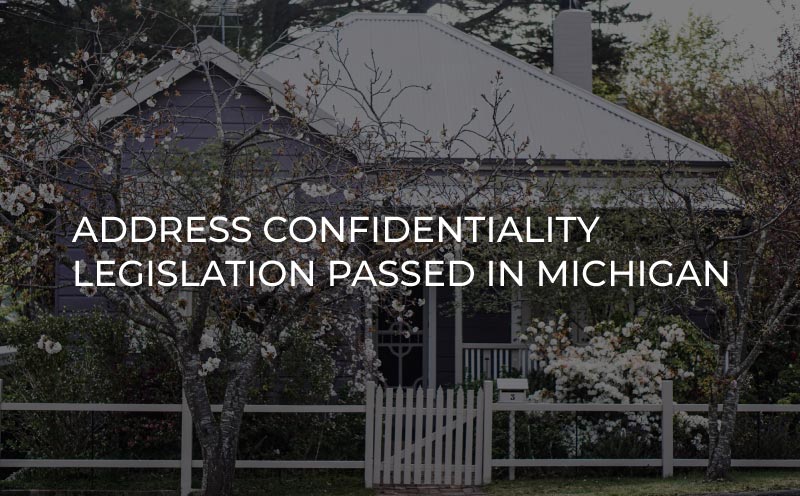Address Confidentiality Program Legislation Passed to Protect Victims

Legislation for an Address Confidentiality Program was recently signed into Michigan law by Governor Whitmer after passing in the state House and Senate to protect victims of domestic violence, sexual assault, stalking, and human trafficking. This legislation plan allows for victims to obtain alternate identification (ID) numbers and a substitute address on official documents to keep their actual physical address confidential. Thirty-seven other states have similar programs in effect, and we are glad to see Michigan join in on providing these additional layers of protection for victims and their families. However, we also recognize a few shortcomings of this legislation that we hope to see addressed in the future.
What Protections are Available Under the Address Confidentiality Program?
Victims looking for peace of mind while staying safely hidden from their perpetrators can enter this program to have their state ID card altered. The program requires the Secretary of State to reissue the participant’s driver’s license or official state ID card with their substitute address printed on it, rather than their actual physical address. The substituted address will be a non-physical address, such as a post office box, to keep the participant’s actual physical location confidential. Cardholders can use this ID card for voting and official identification purposes, just as a non-participant’s ID card.
Under this program, a participants’ physical address is protected from Freedom of Information Act requests. This ensures that a perpetrator cannot misuse this information to find their physical location and grants victims peace of mind knowing that they have this extra layer of protection. Participants are also exempt from jury duty while in the program to keep their location at a given time out of public records.
Children are offered the same protections if they or their parent/guardian is a program participant. Schools are prohibited from disclosing the address of any student, parent, or guardian that is in the program.
A Few Shortcomings of the Current Legislation
Although the new legislation is certainly well-intentioned, the new law falls short in giving victims as much address confidentiality as it should. In the context of the criminal justice system, victims of domestic violence, sexual assault, stalking, and human trafficking deserve additional protections to prevent disclosure of their confidential address in the criminal process.
For victims of domestic violence, the lethality of their relationship often increases when a victim leaves or involves law enforcement. This means that victims should be granted even more protection once law enforcement is involved. Sadly, that is not currently the case.
Outside of the ways in which physical addresses of victims remain confidential under recent legislation, in the context of criminal law, perpetrators can easily (and legally) obtain the victim’s address via other means. For instance, a victim sometimes discloses to law enforcement their current address during an in-person discussion with the police officers. If an officer’s bodycam records that conversation, that the footage is later provided to the perpetrator’s criminal defense counsel without any of the sensitive information, the perpetrator may still be able to locate the victim. Additionally, 911 calls are recorded and often include the caller’s contact information, including their current location. Victims provide 991 with this information without knowing that the notes from their 911 call will be provided to the criminal defendant.
Information exchanged during the legal process of pressing criminal charges against perpetrators is generally not protected in the current Address Confidentiality Program legislation. This oversight unfortunately may still leave victims vulnerable.
Addressing the Current Need for Address Confidentiality Legislation
One unfortunate impact of the COVID-19 pandemic has been an increase in calls for personal protection orders and added difficulty in maintaining confidentiality over a digital landscape. Victims stuck at home with their abuser often experience increased difficulty in reaching out for help, and even holding court hearings online has created unique security concerns. The new Address Confidentiality Program will hopefully help keep victims of domestic violence, sexual assault, stalking, and human trafficking crimes safe from their attackers. However, we hope to see increased protections in the future, as the need for this added protection is needed now more than ever.

